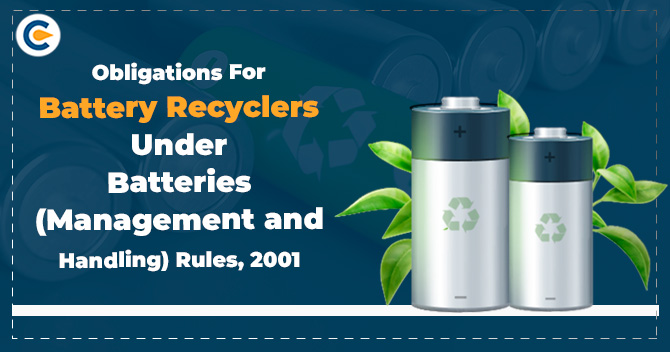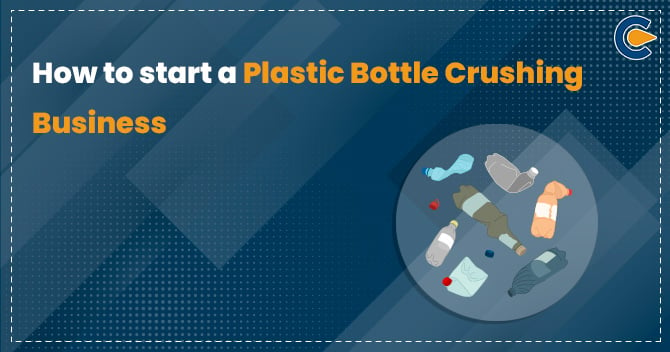India has a huge marketplace for battery production and consumption. Considering the risk posed by batteries to the environment and human life, the Indian government has enacted the legislation known as Batteries (Management and Handling) Rules, 2001. The said rules underpin various compliances and norms to ensure safe and apt handling of batteries throughout the supply chain.
According to Batteries (Management and Handling) Rules, 2001, the battery means a lead-acid battery that generates electricity and contains lead metal. The said rules apply to every producer, importer, re-conditioner, dealer, assembler, recycler, auctioneer, and consumer(s) engaged with the production, processing, sale, purchase, and utilization of batteries or components.
Who are Recycler and Registered Recycler as per the Batteries (Management and Handling) Rules, 2001?
According to the Batteries (Management and Handling) Rules, 2001, the term ‘recycler’ implies an occupier involved with processing used lead-acid batteries of its component for recovery the metal like lead. Meanwhile, ‘registered recycler’ is the one who is registered under MoEFCC for reprocessing utilized lead-acid batteries and their components.
Lead Acid Batteries and Safety Concerns
Lead-acid batteries entail lead, lead oxide, sulphuric acid, and lead sulphate. The negative electrode comprises metallic lead, containing a minor amount of calcium, antimony, and tin. The positive electrodes consist of lead oxides in several compositions.
According to international health and environmental norms, lead and lead oxides are tagged as hazardous heavy metal materials. The electrolyte refers to a concentrated solution of sulphuric acid, and it may cause serious harm to human skin.
Under an ideal operating scenario, no chemical components can escape the battery enclosure. Rigorous handling and treatment, however, may pose a risk of exposure. Under the production of such batteries and during the recycling of utilized batteries, special attention is required for averting chemical exposure to the production staff. This is one reason for the existence of Batteries (Management and Handling) Rules, 2001, as it seeks to promote safe and apt management of lead-acid batteries.
Responsibilities of Recyclers under Batteries (Management and Handling) Rules, 2001
Each recycler shall;
- Apply for registration to the concerned ministry or an agency designated by it if not applied already by furnishing details in the prescribed application form.
- Ensure strict compliances of norms of registration; however, those already registered with the competent ministry or designated agency for reprocessing utilized batteries would be bound by the norms of such registration.
- Submit annual return in form VII to the respective state board
- Make available all records related to the receipt of utilized batteries, quantities, sources, and metal yield to be furnished to the SPCB for inspection.
- Mark “Recycled” on lead retrieved via reprocessing; and
- Create public awareness via publications, advertisements, posters or others relating to the following
(a) hazards of lead; &
(b) Duties of consumers to return utilize batteries only to the authorized dealers or deliver at the designated collection units.
Procedure relating to the registration/renewal of registration of recyclers
(1) Every recycler of utilized lead-acid batteries shall file an application in the prescribed form along with below-mentioned documents with the Joint Secretary, Ministry of Environment and Forests or any other designated agency for grant of registration or renewal;
(a) A copy of the legitimate consents issued by the respective SPCB.
(b) A copy of authorization issued under Hazardous Wastes (Management and Handling) Rules, 1989
(c) A copy of registration certification with DIC i.e. District Industries Centre;
(d) A copy of the document evidencing the installed capacity of the unit granted by either District Industries Centre/ SPCB
(2) The Joint Secretary, MoEF or any designated official shall pay a visit to the applicant’s facility to make some compliance check relating to equipment available, disposal unit, or technical capabilities,
(3) The Joint Secretary, MoEF or any designated official shall decide on an application for registration within the duration of ninety days from the date on which the application was received.
(4) The registration conferred shall be in effect for two years from the issuance date or from the renewal date unless suspended or cancelled earlier;
(5) An renewal application shall be filed in Form VI at least six months prior to its expiration. The Joint Secretary, MoEF or any designated official shall renew the registration granted under sub-rule (4) of this rule, post scrutinizing each case on merit;
(6) The Joint Secretary, MoEF or any designated official may, after providing reasonable opportunity of being heard to the applicant, refuse to accord registration;
(7) The Joint Secretary[1], MoEF or any designated official may cancel or suspend a registration granted under governing rules if in his/her opinion, the recycler has failed to adhere to any norms of registration or with any guidelines of the Act post rendering him an opportunity to share the reasons therefor;
(8) It shall be liability of the State Boards to keep the tap on the compliance of norms prescribed which granting registration, and
(9) An appeal shall lie against any judgement of cancellation or suspension passed by the said authority. The appeal shall be in writing and attested with an order copy appealed against and shall be provided within thirty 30 days of the judgment’s passing.
Conclusion
Using batteries in households is relatively uncommon today. It serves various purposes and acts as an alternative power source. Batteries have some severe environmental and health-related hazards, and therefore they are required to be produced and handled aptly. Batteries (Management and Handling) Rules, 2001 promote the safe handling and treatment of such batteries by underpinning relevant norms.
Read our Article:Hazardous Waste Management: Know the Import Legalities











